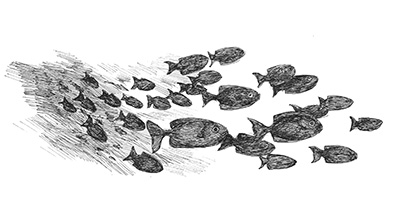Collective animal behavior models revisited
12-19-2016

Collective animal behavior models revisited
Biologists and engineers have been interested in collective animal behavior (i.e., coordinated movements of bird flocks, fish schools, mammal herds, insect swarms) for decades, because establishing the rules animals use to coordinate their behavior with group mates can have multiple applied applications (e.g., unmanned aerial vehicles, disease transmission prevention, etc.). These rules have been incorporated in multiple mathematical models that intend to predict the behavior of these groups. These models make biological assumptions about the individuals interacting in the groups (e.g., interaction distance, number of group mates tracked, etc.). A recent paper published in Royal Society Open Science by Ph.D. student Diana Pita and Prof. Esteban Fernandez-Juricic found that the sensory assumptions often used in these mathematical models do not match with the real sensory configuration of the species studied. More importantly, when considering the realistic sensory assumptions, these mathematical models make very different predictions about collective behavior. These findings have important implications for developing future models that better predict collective animal behavior and establishing the sensory cues animals use to track neighbors.
Source: Pita D, Collignon B, Halloy J, Fernandez-Juricic E. 2016 Collective behaviour in vertebrates: a sensory perspective.R. Soc. open sci.3: 160377. http://dx.doi.org/10.1098/rsos.160377
Paper can be downloaded from: http://rsos.royalsocietypublishing.org/content/3/11/160377